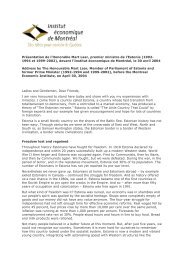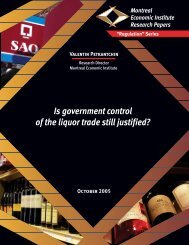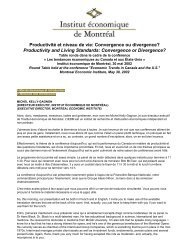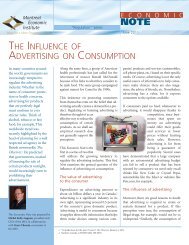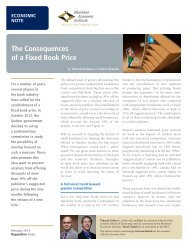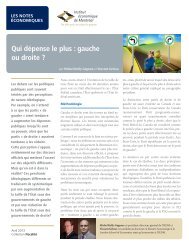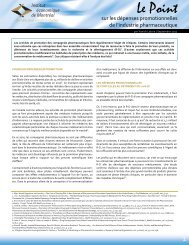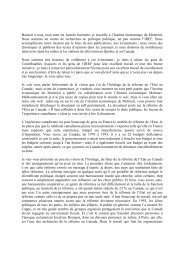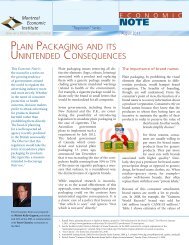Union certification: Developing a level playing field ... - LabourWatch
Union certification: Developing a level playing field ... - LabourWatch
Union certification: Developing a level playing field ... - LabourWatch
Create successful ePaper yourself
Turn your PDF publications into a flip-book with our unique Google optimized e-Paper software.
<strong>Union</strong> <strong>certification</strong>: <strong>Developing</strong> a <strong>level</strong> <strong>playing</strong> <strong>field</strong> for labour relations in QuebecIntroductionIn votes of various types, such as electionsand referendums, the secret ballot is seen as a wayof guaranteeing that voters are protected frompressure or intimidation and of ensuring that thevote represents their true opinion. However, thisis not the approach used in labour relations inQuebec and elsewhere: the outcome of a union<strong>certification</strong> or a strike vote may be determinedby a less rigorous process that involves canvassingworkers to get signatures or a show of hands infavour of a strike. This procedure may alterworkers’ true will and encourage labour relationsdisputes, putting economic growth and investmentat risk.The British government attacked this problemsuccessfully in the 1980s by pushingthrough several laws that included measures toimplement secret votes for union <strong>certification</strong>sand strikes and to have ballots sent in the mail.In Quebec and across Canada, employersand employees face various challenges regardinglabour relations and its related laws. The maintopics of discussion in recent years have involvedanti-scab legislation, the Rand formula, union<strong>certification</strong> rules, and new forms of labourrepresentation.The anti-scab law was introduced as anamendment to Quebec’s Labour Code in 1977. In1993, the province of British Columbia adopted asimilar law. Anti-scab rules prevent establishmentsfrom replacing striking or locked-out workers. 1The arguments in favour of such legislation arethat it would decrease violence and shortenconflicts between employers and employees.However, studies could not prove these positiveeffects. Rather, the economic effects of anti-scablaws were found in some studies to involvereductions in employment and investment.In Canada, legislation allows the Randformula to apply to a collective agreement, whichmakes it compulsory for employees to pay tradeunion dues even if some employees do not wantto be part of the union. “In contrast, U.S. federallegislation states that nobody can be forced tojoin a union. Moreover, in U.S. states with “rightto work” laws, nobody is automatically requiredto pay union dues. These states give workers themore democratic choice of whether or not tosupport a union.” 2However, debate on reform of federal labourrelations law continues in the United States,especially with regard to union <strong>certification</strong>.<strong>Union</strong>-friendly bills (the Employee Free ChoiceAct and the Re-Empowerment of Skilled andProfessional Employees and Construction TradeworkersAct) have received the support of the newpresident.Discussion on union <strong>certification</strong>, the mainsubject of this research paper, focuses on findingthe best procedure for obtaining <strong>certification</strong>.According to an opinion poll commissioned bythe Conseil du patronat du Québec in October2006, 79% of Quebecers think the governmentshould change the law and require the secretballot as a way of getting union <strong>certification</strong>. 3Support for this change is even stronger amongunionized workers, at 83%.1. Guy Lemay and Norma Kozhaya, The perverse effects of anti-scabmeasures, Economic Note, Montreal Economic Institute, January2005, p. 1.2. Norma Kozhaya, The consequences of a strong union presence in Quebec,Economic Note, Montreal Economic Institute, September 2005, p. 2.3. Pascale Gauthier, Les grands dossiers en relations de travail, Conseil dupatronat du Québec, November 2007, p. 1.Montreal Economic Institute7



